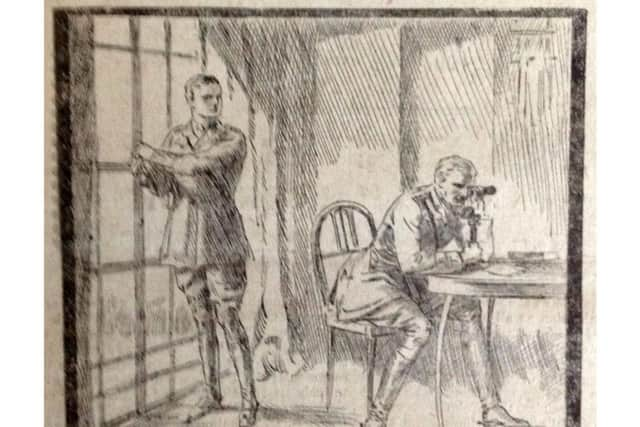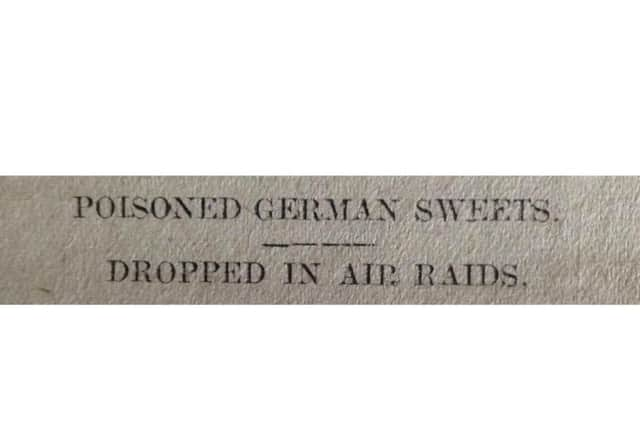John's real-time WW1 blog: Underhand German pilots drop chocolates laced with arsenic in bid to kill our children


Desperate German airmen have resorted to dropping poisoned chocolates as well as bombs, according to the February 26, 1918, edition of the Market Harborough Advertiser.
The actions of the dastardly Huns are confirmed by none other than the War Office where an official says the deadly sweets have been discovered in three different districts around London.
Advertisement
Hide AdAdvertisement
Hide Ad

The official says: “Recently during a raid there, residents in a small house in Essex heard a pattering on the roof and when the ‘All clear’ had been given two young boys climbed through the skylight in search of shrapnel.
“They found some and were surprised to discover also eight or nine chocolates. The sweets were very hard and had been flattened out by striking the roof.”
Apparently, the father was suspicious and took them to the police station where they have been sent off for testing – with no results declared as yet.
This might seem a strange story to include in the Market Harborough Advertiser: the story is well outside the newspaper’s circulation area and there hardly seems to be any conclusive proof that there is poison in the chocolates let alone that they were deliberately dropped by German planes.
Advertisement
Hide AdAdvertisement
Hide Ad

But this is another example of how the famed British propaganda machine works – not with bombastic pronouncements but with intimate subtlety.
The story gains more ‘credibility’ when it goes on to recount that a ‘specialist constable found some chocolates in a road and in these there is a trace of arsenic’.
In this incident, there is no verification of the story: no names, no places, and no supporting evidence that the chocolates came after an enemy air raid.
That doesn’t stop the official concluding with a sweeping statement – unlikely to be tested – that is designed to bolster the flagging spirit of Harborians and other small towns where this story is also bound to appear. He adds: “If German airmen are dropping these chocolates it is not a new form of frightfulness. They did it in Belgium months ago with the result that several little children who picked them up were poisoned.”
Advertisement
Hide AdAdvertisement
Hide Ad

And just in case any readers think this war does not affect them then the official issues a cautionary reminder.
“People must warn their children against eating chocolates they pick up and if any of these sweets are found they should be sent immediately to the police station.”
There is more evidence of British propaganda in this week’s Advertiser with the story of a ‘cowardly German aviator’. The article – again from London and again with no verification – is masterly in its delicate insidious desecration of the German character.
The account begins: “An English nurse home on leave from France relates a striking story of a German airman’s fatal funk in the presence of danger.”
Advertisement
Hide AdAdvertisement
Hide Ad

It is a wonderful opening line, no doubt written by the Army’s Press Bureau spin doctors. It conjures in the reader’s mind the bravery of English womanhood in stark contrast to the spineless arrogance of the enemy airmen. And what about the cheeky alliteration in ‘fatal funk’, phrased of course to add further ridicule on the pilot?
Apparently, the airman had been captured when his plane was shot down during a raid over London. He survived but had to be taken to hospital with a badly injured knee.
The aviator repays this kindness by the British authorities by ‘boasting of the ruin and deaths caused by German bombs in London’.
This behaviour demonstrates how ungrateful and ungentlemanly the man is – and by association the entire German nation – and there is more ‘proof’ to come.
Advertisement
Hide AdAdvertisement
Hide AdThe article continues: “Two nights later an air raid by his own comrades took place in the neighbourhood of the hospital in which he lay. So terror-stricken was the wounded man that he clambered out of bed and tried to seek refuge in a room below.”
So now we have the corroboration: the German airman is most definitely NOT a gentleman and he is clearly a COWARD.
And the moral to the story, if the reader really needs it hammering home, comes in the final sentence. “The airman, in his condition of helplessness and fright, fell headlong down the stairs sustaining fatal injuries.”
There are many other references in this edition to the low character of the Germans and the stoic bravery of the British, epitomised in a ‘great spy drama’ show at the Leicester Opera House.
Advertisement
Hide AdAdvertisement
Hide Ad“It is easily the most powerful of war plays dealing with the present world conflict,” according to a preview about the show which is accompanied by a dramatic line drawing.
Apparently, the climax involves a ‘wonderful swimming feat of a British heroine, Lady Mary Heather, which results in the sinking of a German U-boat’.
Well, of course, a female aristocrat could easily tackle the freezing depths of the Atlantic Ocean in just a swimsuit and defeat the enemy's sneaky and underhand new weapon of war. Couldn’t she?!